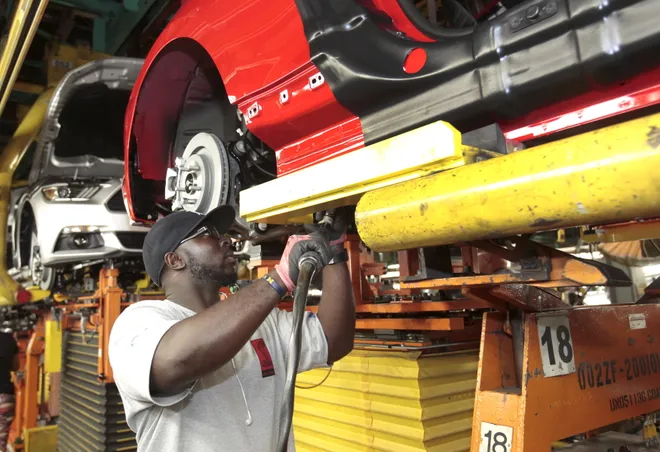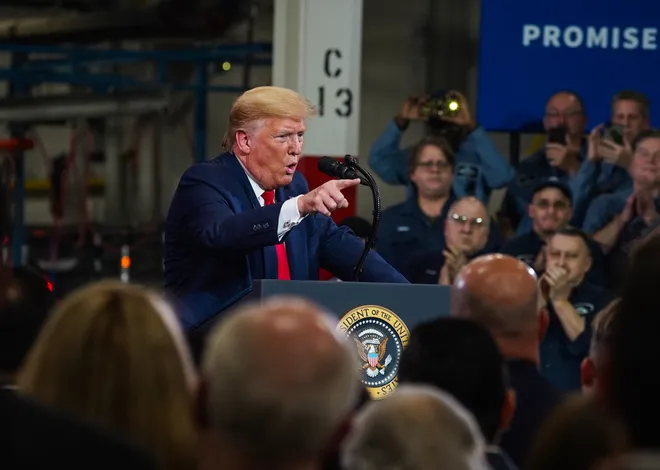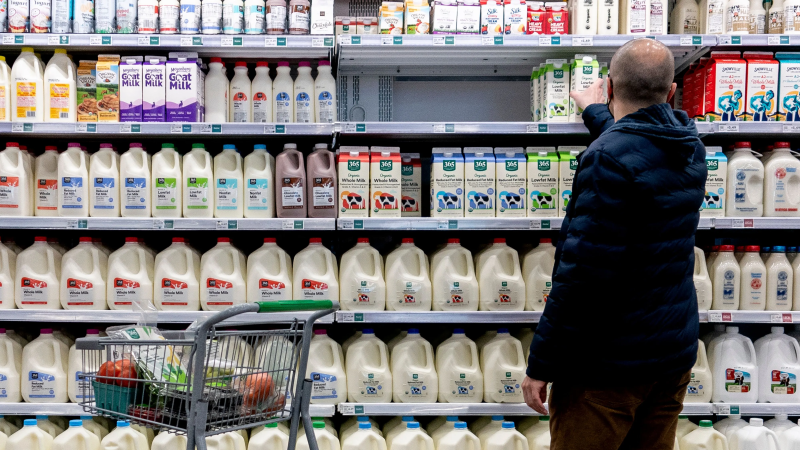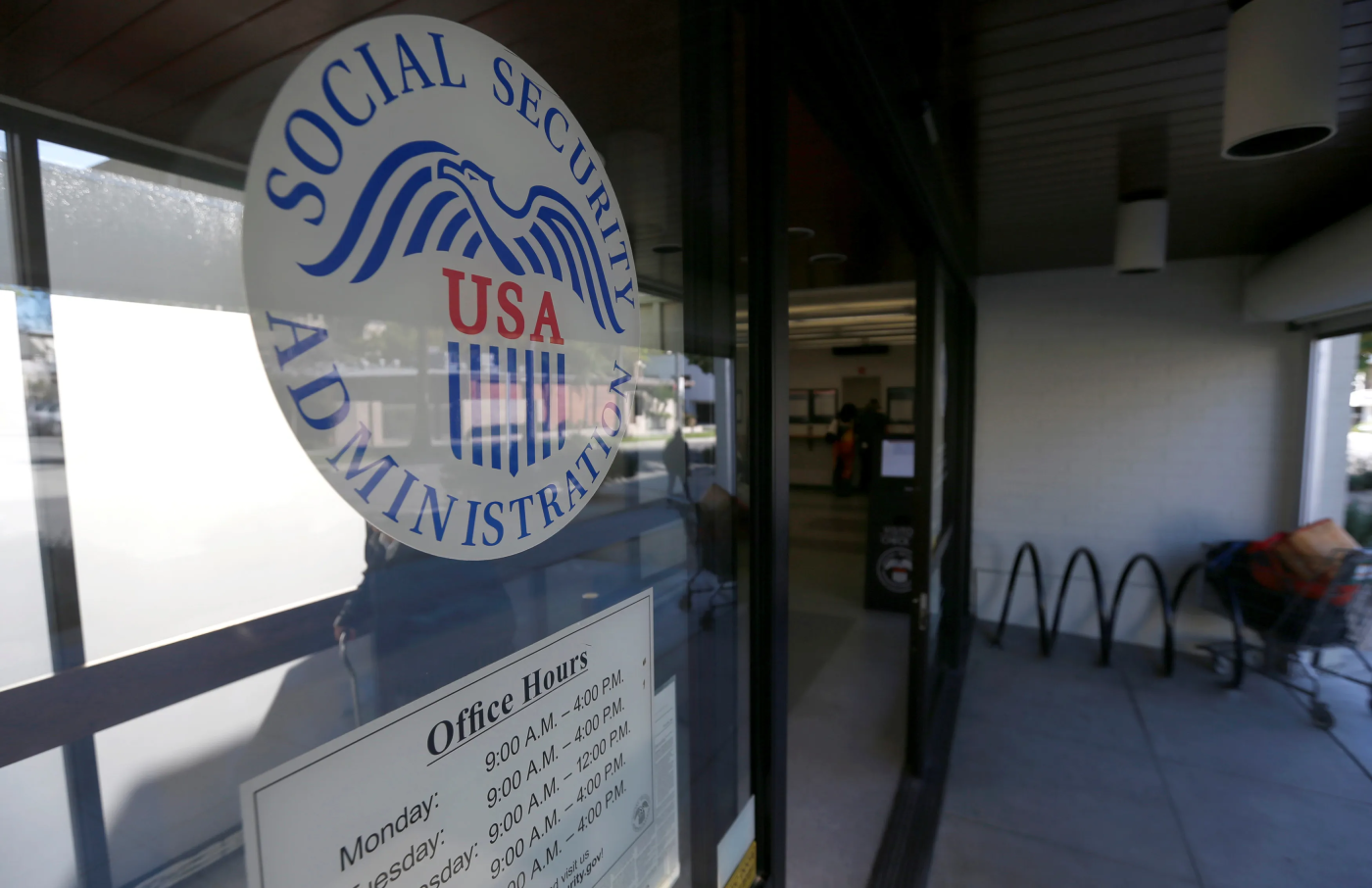
Detroit automakers see stock prices drop as Trump's trade war, tariff fears shake market
Auto stocks took a brutal hit Monday, as threats of Trump's shocking trade war roiled Wall Street.
By Monday afternoon, though, some temporary relief was in sight as President Donald Trump agreed to pause tariffs on Canadian imports for at least 30 days, and pause tariffs on imports from Mexico for one month.
Auto stocks might see some breathing room ahead but plenty of uncertainty regarding key trading partners remains.
General Motors stock was down a bit more than 6% and trading at $46.46 a share at 9:45 a.m. Monday, down $3 a share. Ford Motor Co. stock was down nearly 4% and trading at $9.69 a share Monday morning, down 39 cents a share.
Stellantis was trading at $12.43 a share, down 70 cents a share or 5.33% within the first 20 minutes of the trading day Monday.
Maximize your savings: Best high-yield savings accounts
The U.S. auto industry is a carefully oiled machine when it comes to the vast amount of auto parts that travel across U.S. borders with Canada and Mexico. On top of that, the proposed tariffs could pack a devastating hit to the prices of cars and trucks, which are increasingly unaffordable for average consumers as it is.

Not surprisingly, the early sell-off in auto stocks was much worse than the overall stock market, which was bad enough. The Dow Jones Industrial Average was down 1.47% shortly after 10 a.m., losing 656.89 points to trade at 43,887.77 points.
Monday might have given us a glimpse of what could be in the weeks ahead as worries about a potential trade war build. But it's important to remember that we don't know what's next when it comes to tariffs with our major trading partners — Canada, Mexico and China.
How bad things will get is debatable even though much of the atmosphere on Wall Street initially seemed like a level of panic we've not seen in quite some time. Things settled somewhat later in the day.
Shortly before 10:30 a.m., auto stocks gained ground and GM was down by around 3%, Ford was down around 1.4%, and Stellantis was down around 3%.
The Dow was down around 0.65% shortly before 10:30 a.m. By 12:30 p.m., the Dow was only down 0.27%.
At the trading bell, the Dow was down 122.75 points or 0.28% to close the day at 44,421.91 points.
GM closed at $47.90 a share, down $1.56 a share or 3.15%.
Ford closed at $9.89 a share, down 19 cents or 1.88%.
Stellantis closed at $12.62 a share, down 51 cents or 3.88%.
Auto stocks appeared to get some relief as more news broke relating to a pause in Mexico, and potential talks with Canada.
CNBC quickly reported early Monday that talks were ahead with Canada on Monday afternoon.
CBC News in Canada reported that Prime Minister Justin Trudeau spoke to Trump early Monday morning about the potential trade war.

Trump later spoke with Trudeau at 3 p.m. Monday. Some speculated that Trump could put the Canada tariffs on hold after the phone call he had with Trudeau on Monday afternoon. Shortly before 5 p.m. Monday, Trudeau announced the latest temporary relief on tariffs on X and Trump issued a similar post.
Trudeau said Canada had committed to creating the post of a special czar to combat the smuggling of fentanyl and would ensure permanent monitoring of the shared border, according to Reuters.
The 25% tariff on Canadian goods was set to go into place on Tuesday. Energy resources from Canada would have had a lower 10% tariff.
Shortly after 10:30 a.m., CNBC reported that Trump paused the new tariffs on Mexico for one month. Mexico President Claudia Sheinbaum posted on social media that Mexico will immediately reinforce its northern border to prevent drug trafficking from Mexico to the United States, particularly fentanyl. Mexico agreed to send 10,000 National Guard troops to the U.S. border; while Trump agreed to work to slow the flow of American weapons south of the border.
Trump confirmed the one-month Mexico deal via social media Monday morning.
Later on Monday, Trump told reporters he would be speaking with China within the next 24 hours.
Investors will need to realize that uncertainty is the name of the game these days in Washington, and now on Wall Street, as Trump moves quickly to shake up the status quo and trigger chaotic developments.
On Monday morning, the initial recovery on Wall Street showed that the markets were holding up better than expected, according to David Sowerby, managing director and portfolio manager for Ancora Advisors in Bloomfield Hills.
Even so, he said: "Tariffs could well be the catalyst to a correction."
Sowerby said there is a potential for a 5% to 7% correction on Wall Street, with the stock market averaging a "5% hiccup two times a year." The market can see a 10% correction once a year.
For investors, Sowerby said, it may be even more important to understand what they own and how those companies are exposed to the three big largest trading partners with the United States — Canada, Mexico and China.
Basic economics classes teach you that tariffs are a tax on consumers, Sowerby noted, and Trump's tariffs would be no different.
Not if, but when:Tariffs could bring a spike in car, grocery prices — and soon
Why Trump said he launched swift action on tariffs
On Feb. 1, the White House announced that it was "addressing an emergency situation."
"The extraordinary threat posed by illegal aliens and drugs, including deadly fentanyl, constitutes a national emergency under the International Emergency Economic Powers Act," according to a White House statement.
Trump wanted to implement a 25% tariff on imports from Canada and Mexico and a 10% additional tariff on imports from China. Energy resources from Canada were to see a 10% tariff, according to the White House fact sheet.

Trade war criticized
The Wall Street Journal had a blistering editorial posted attacking Trump's 25% tariffs on Canada and Mexico, dubbing it the "Dumbest Trade War in History."
The editorial threw a harsh new word into our vocabulary, autarky.
"Mr. Trump sometimes sounds as if the U.S. shouldn’t import anything at all, that America can be a perfectly closed economy making everything at home," according to the Wall Street Journal editorial.
"This is called autarky, and it isn’t the world we live in, or one that we should want to live in, as Mr. Trump may soon find out."
It's a level of protectionism and distaste for trade that leaders of most countries recognize hurts economic growth. And Wall Street cannot help but keep a careful watch on the situation.
How a trade fight could hurt the US auto market
Michigan's economic outlook will be walking a tight rope the longer higher tariffs, particularly those hitting the auto industry, remain on the table — and threaten to drive up the cost of cars and trucks.
Gabriel Ehrlich, director of the University of Michigan's Research Seminar in Quantitative Economics, gave a ballpark estimate indicating that the higher tariffs announced Feb. 1 could raise the cost of producing a vehicle in the United States somewhere between $1,200 to $1,500 per car or truck.
“We have seen other estimates that are higher,” Ehrlich said.
In addition, he said, the announced tariffs could add about $8,000 to $10,000 to the costs per vehicle for cars and trucks imported from Canada and Mexico. That increase, he said, would presumably be distributed among producers along the supply chain, dealers, and consumers.
“Based on the distribution of imports in the auto sector,” Ehrlich said, “our sense is that the announced tariffs on China would have the smallest effects on Michigan's economy, the tariffs on Canada would have a larger effect, and the tariffs on Mexico would have the largest effects.”
Ehrlich said some possibility exists that the pending tariffs could be avoided.
“There seems to be a chance that some or all of Mexico, Canada, and China will be able to come to an agreement with the United States to avoid the tariffs,” Ehrlich said.
“Even if the tariffs are ultimately imposed, they may prove to be short-lived, and there may be substantial sectoral and company-specific exemptions. We would expect the impact on Michigan's economy to grow over the medium term if the tariffs prove to be durable," Ehrlich said.
Tariffs 'even larger' than anticipated
What's unsettling is how quickly Trump acted on his much-talked-about tariffs after Inauguration Day Jan. 20.
"The announced increase in tariffs were even larger and came faster than we had penciled in," according to a report issued Monday by BNP Paribas.
As a result, the prices consumers pay for many goods are expected to "rise sharply over the coming months, while tariffs should put the brakes on economic growth," according to the Monday morning report from the French multinational bank and financial service company.
Even if the tariffs prove temporary, the report noted, the fact that Trump imposed the tariffs before negotiating raises the potential economic costs.
The assumption, the report noted, had been that negotiations would prevent tariffs on Canada and Mexico from going into place.
The risk of ongoing escalating trade war could go up from here, according to some analysts. But we will hear more in the days ahead about what trade talks might yield.
(This story has been updated to include new information.)
Contact personal finance columnist Susan Tompor: [email protected]. Follow her on X @tompor.

